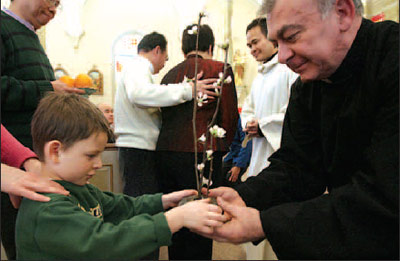March 29, 2009

‘Missionary’ life in Chicago’s Chinatown

Father Michael Davitti, pastor of St. Therese Church in Chicago’s Chinatown, accepts fruit, wine and flowers as symbols at an ancestral memorial following Mass during celebration of the 2008 Chinese Lunar New Year. He said his appreciation for the Chinese culture is in his Tuscan “blood.”Catholic New World/Karen Callaway
He is: Xaverian missionary Father Michael Davitti, pastor of St. Therese Parish in Chinatown since 1999.
Growing up: He was born in Fiesole, Italy — “Fiesole, the old Florence, was founded by the Etruscans. Down the valley from my village’s hilltop is where St. Philip Neri was born. A few years ago I brought five families from Chinatown to Fiesole. They saw the Christianity lived there is the same Christianity they had received. It was an eye-opener.”
Life in Fiesole: “Tuscany shaped me a lot. I only realized this later when I met people who were not from the area. We know more words than any other region and we like to talk tongue in cheek. Italian is the language of the Tuscans that other people had to learn. My appreciation for China and art — I believe it is in my blood.”
Childhood: “I learned so much about Christianity from my people through their proverbs and celebrations. We say, ‘God sends the cold according to the kind of clothing his people are wearing.’ Meaning he will not send you something you cannot handle. My grandmother used to tell me, ‘Look at the basil. You pick it and instead of cursing you, it perfumes your fingers.’ I found it also in the Bible, ‘Return a blessing for a curse.’”
Mentors: “Our parish priests were dedicated to their people. In World War II the partisans and the army left the old, the women and kids behind. Since the priests were the ones who spoke more than one language, they mediated with the Germans and the Allies to keep the population safe.
They forged documents for Jewish people and sheltered them in seminaries. I was 2 years old, but these stories were told in the family. We had the Red Book, with names of priests killed because of their faith and dedication.”
Typical teen: “As a teenager Christ was my hero. But I found the church difficult because there were a lot of commandments. Things I liked were forbidden and things I disliked were commanded. I used to question my mother and grandmother (she shaped me a lot), ‘Why should I go to confession every week and tell my sins to the priest? He never tells me his.’ What I got in return was a slap on the head.”
Vocation: “I asked God so many questions: ‘Do you exist?’ ‘Is it possible to know you?’ He never answered until I was celebrating my silver jubilee as a priest. I entered the sacristy in my hometown and saw the Sacred Heart statue I used to pray before. Now it was in the sacristy. He seemed to speak to me in my heart and say, ‘Michael, have I answered all your questions?’ And for an instant, at 55, I could see my life in retrospect. I said, ‘Yes Lord, beyond all expectations.’”
Priesthood: “Vatican II seemed to ratify what the missionaries were already living. After ordination in 1970 as a Xaverian, I studied in Rome at the Gregorian. In London I got my masters in cultural anthropology. Since the people I was going to were 90 percent Muslims, I studied the Quran in Cairo. In the Holy Land I did Biblical archeology. Then I believed I was equipped for the missions.”
What he really learned: “I was wrong. There was too much of myself. I had a big brain on a small body. I came to realize God is always there under our nose: to meet him is the easiest and most natural thing in life. But you must play ‘hide and seek’ with him. He likes to come to us in disguise. As people say in Asia, ‘You don’t find God in temples, you meet him in the market square’ — in the ordinary life.”
Years in Africa: In all, he spent 22 years serving in Africa, first as pastor of the cathedral in Makeni, Sierra Leone. Then as secretary general of the Episcopal Conference for Liberia, Gambia and Sierra Leone. Next he served as national director of the Pontifical Missionary Societies.
“It was a rich experience. It made me realize how much the church is doing for developing countries and how important it is for the church to train African leaders for both the state and the Church. Africa’s future rests on these two pillars.”
Life in Chinatown: “I have learned here always to be with your people. As a ‘boss’ you have to lower your voice; see a lot and speak less. Never challenge people openly. If they lose face they will smile at you, bow and disappear. You will lose not one person but a whole family.
We celebrate Lunar New Year in church. Why am I so enthusiastic about this? Because God is working inside the church but mostly outside, leading these people through their own problems to Christ. Our four Bible groups at St. Therese are in Cantonese, Mandarin, Indonesian and one in English with me.”
Still learning: “The dialogue between East and West going on in this little place called Chinatown is very enriching. Coming in contact with the noble cultures of Asia and Africa I realize my contribution is to the bigger picture. As a Christian and claiming to believe in the Trinity, the differences should be looked on as a gift, not a threat. Preparing the bulletin I read a lot about the church in Chicago, but at the same time I look at what is happening in the church in China and the problems of youth. Last June I became an American citizen.”
Cultural ‘tastes’: I can travel the world without leaving Chicago. Sometimes I go to Argyle Street on the North Side because there you have Vietnamese-Chinese people in the second Chinatown. I go to Arlington Heights for Japanese foods and Clark Street for Korean. I snoop around, but without knowing the languages, I buy two things that I know and one thing I do not know. I ask the Korean lady, ‘How do you cook this?’ I am open. I try to be appreciative.”
Wish list: “Sundays after Mass we go downstairs to the basement of our church for catechism, games, making rosaries, movies of formation and we eat. People come at 9:30 a.m. and don’t leave until 2 p.m. It gives me an opportunity to greet everyone. We need a center where we can welcome students to America. Not like a hostel, but a place where ‘If you need a visa, here’s where you sign up.’ Things like that. I’d like this community to be a magnet for other Catholic Asian communities present in the archdiocese.”
Advice: “I teach what I call silent meditation. Silence is not the absence of noise, but the absence of the ego. The ego gets in the way when you sit in meditation. Stay still in the present. This is the secret.”
Lent: “I don’t have a plan. God has a plan. My plan is to stay as an empty canvas in front of God and let him do the painting. My Lent is to help my parishioners, forgetting myself, to have a good holy Lent.”
 Catholic
New World - Newspaper for the Archdiocese of Chicago
Catholic
New World - Newspaper for the Archdiocese of Chicago Archdiocese of Chicago Directory
Archdiocese of Chicago Directory Oficjalne wydawnictwo Archidiecezji Chicago w języku polskim
Oficjalne wydawnictwo Archidiecezji Chicago w języku polskim